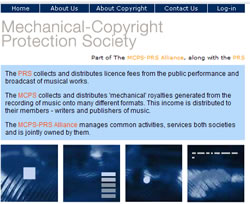 “A wide music industry grouping representing the independent record industry, composers and songwriters, musicians and performers, music managers, music publishers and their collecting societies hosted a crucial round table meeting yesterday, chaired by the Smith Institute, to debate the creation of a progressive and innovative copyright framework that is fit for purpose in the digital age.”
“A wide music industry grouping representing the independent record industry, composers and songwriters, musicians and performers, music managers, music publishers and their collecting societies hosted a crucial round table meeting yesterday, chaired by the Smith Institute, to debate the creation of a progressive and innovative copyright framework that is fit for purpose in the digital age.”
Which is the official line anyway, whether it has any relevance to the real world is a mute point and potentially completely misunderstood.
After the “industry” round table, a press conference was held, with the following representatives: –
Adam Singer (Chief Executive MCPS PRS Alliance) (below right), Alison Wenham (Chairman, Chief Executive, AIM) Dave Rowntree (Drummer with Blur + Ailerons) Andy Heath (Managing Director 4AD Music, British Music Rights Board) David Ferguson (Chairman, British Academy of Composers & Songwriters) Doug D’Arcy (AIM Board, Managing Director Songlines) Horace Trubridge (Assistant General Secretary Musicians Union) Jazz Summers (Chairman Music Managers Forum, CoFounder Big Life Management)
A value recognition right
This is the whole premise of their argument. Anyone involved in the distribution of content (whether they are aware of it or not) should be considered part of the value chain and therefore subject to licensing constraints.
 The Copyright Levy laws were designed for analogue, but digital changes everything, control has passed to other players (ISPs, mobile operators, iPods etc) rather than traditional channels with physical controls. So the intent is to license these distributors. This will of course require working with them, understanding their business models etc.
The Copyright Levy laws were designed for analogue, but digital changes everything, control has passed to other players (ISPs, mobile operators, iPods etc) rather than traditional channels with physical controls. So the intent is to license these distributors. This will of course require working with them, understanding their business models etc.
It’s all about a mechanism for creating a better working relationship with distribution channels.
The groups are already lobbying government to change the law so that these new distribution channels will now be considered actual distributors as the content is adding value to the distributor, therefore the industry should get a cut of the added value.
It’s estimated that £0.5 billion has been lost in license revenues due to illegal sharing. Current copyright law actually forbids copying a CD to iPod (or any other kind of digital copy).
They agree there is more work to do and they’ll publish the report in September including transcripts of discussions held yesterday morning.
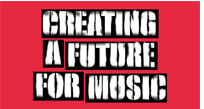 These issues don’t just apply to the music industry and they’re gaining traction from other content industries and internationally.
These issues don’t just apply to the music industry and they’re gaining traction from other content industries and internationally.
Statistics are everything
One of the major stats used to justify their argument is that 60% of Internet traffic is file sharing, initially it was stated that this was “music sharing”, but this was changed to general sharing. There is a lot of P2P traffic and though a lot of it is probably music sharing, services such as Skype and other legal P2P services will also make up a good percentage.
They then utilise these figures that as so much traffic is P2P, users are signing up for broadband because of file sharing i.e. P2P is adding value and therefore attracting users and they want a cut of the added value.
It’s actually probably the other way around, people sign up for broadband for many reasons. Nowadays, because it’s given away free as a bundle with other services, but also because it’s cheaper than (or near enough the same price as) dial-up. Customers then find P2P is easy and therefore use it.
The margins on broadband are extremely low, Carphone Warehouse (CW) is actually losing money on every customer they sign-up, EVERY month (this will eventually change when they install their own kit in BT’s exchanges). They are buying market share. P2P doesn’t help their situation at all, they’d much rather not have users eating up all CW’s bandwidth which costs them lots of money.
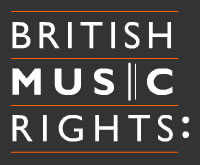 Bulldog have just pulled out of the retail market and have decided to concentrate on the wholesale side and compete with BT Wholesale. Though part of this is that their parent Cable and Wireless (C&W) are trying to consolidate to fewer larger customers (i.e. broadband suppliers who then have lots of customers), part of the problem with having retail customers is you have to constantly upgrade your network to meet their growing bandwidth needs, and this gets very expensive very quickly.
Bulldog have just pulled out of the retail market and have decided to concentrate on the wholesale side and compete with BT Wholesale. Though part of this is that their parent Cable and Wireless (C&W) are trying to consolidate to fewer larger customers (i.e. broadband suppliers who then have lots of customers), part of the problem with having retail customers is you have to constantly upgrade your network to meet their growing bandwidth needs, and this gets very expensive very quickly.
With a wholesale customer base, they only need to provide a certain amount of bandwidth per customer to the retailer, who then has to provide connectivity elsewhere and meet the growing bandwidth requirement pains.
Retailers using BT Wholesale have very small margins, equating to maybe a few pounds per month to provide all the back-end services that customers demand.
Broadband to all
Broadband is becoming a commodity and it’s the value added services that will generate revenue, and what are the value add services? Licensed content, initially likely to be TV (as in IPTV), but other services will follow.
In France broadband is available for 18 Euros per month for 24Mb/s ADSL2+, this includes Internet access, basic TV channels and all you can eat national French dialing. Yes, the companies support P2P, not because they want to, but because customers demand it. The basic service will just about pay for itself, or even make a loss, but then once customers have the broadband in place, they buy premium content and that’s where revenue comes in.
 This model is coming to the UK, BT’s broadband hub service is their first foray into an IP connected world, BT Vision (IPTV) is coming.
This model is coming to the UK, BT’s broadband hub service is their first foray into an IP connected world, BT Vision (IPTV) is coming.
Stealth Tax
The music industry has gotten very bad press for suing consumers, so now they are trying to make the problem go away by taxing (licensing) the distribution channels and hiding the effect from users themselves.
The distribution channels would rather the traffic wasn’t on their networks in the first place, but are being put in a position (which could be driven through by law) where they have to pay for their users’ (mis)use of the network where margins are incredibly low to start with.
This means the channels will have to put up pricing (which means users notice) or absorb the costs themselves and they make even lower margins.
The music industry needs to rapidly have sensible discussions with the ISPs and other distribution channels to sort out the real economics of distribution or it’s likely a stealth tax will come into force which could kill the distribution industry in doing so, which wouldn’t benefit anybody.
 Vivendi Universal, the biggest music group on the planet have signed a deal with Spiralfrog to let surfers download the contents of its man-sized music catalogue for free.
Vivendi Universal, the biggest music group on the planet have signed a deal with Spiralfrog to let surfers download the contents of its man-sized music catalogue for free.  Making it pay
Making it pay “A wide music industry grouping representing the independent record industry, composers and songwriters, musicians and performers, music managers, music publishers and their collecting societies hosted a crucial round table meeting yesterday, chaired by the Smith Institute, to debate the creation of a progressive and innovative copyright framework that is fit for purpose in the digital age.”
“A wide music industry grouping representing the independent record industry, composers and songwriters, musicians and performers, music managers, music publishers and their collecting societies hosted a crucial round table meeting yesterday, chaired by the Smith Institute, to debate the creation of a progressive and innovative copyright framework that is fit for purpose in the digital age.”  The Copyright Levy laws were designed for analogue, but digital changes everything, control has passed to other players (ISPs, mobile operators, iPods etc) rather than traditional channels with physical controls. So the intent is to license these distributors. This will of course require working with them, understanding their business models etc.
The Copyright Levy laws were designed for analogue, but digital changes everything, control has passed to other players (ISPs, mobile operators, iPods etc) rather than traditional channels with physical controls. So the intent is to license these distributors. This will of course require working with them, understanding their business models etc.  These issues don’t just apply to the music industry and they’re gaining traction from other content industries and internationally.
These issues don’t just apply to the music industry and they’re gaining traction from other content industries and internationally.  Bulldog have just pulled out of the retail market and have decided to concentrate on the wholesale side and compete with BT Wholesale. Though part of this is that their parent Cable and Wireless (C&W) are trying to consolidate to fewer larger customers (i.e. broadband suppliers who then have lots of customers), part of the problem with having retail customers is you have to constantly upgrade your network to meet their growing bandwidth needs, and this gets very expensive very quickly.
Bulldog have just pulled out of the retail market and have decided to concentrate on the wholesale side and compete with BT Wholesale. Though part of this is that their parent Cable and Wireless (C&W) are trying to consolidate to fewer larger customers (i.e. broadband suppliers who then have lots of customers), part of the problem with having retail customers is you have to constantly upgrade your network to meet their growing bandwidth needs, and this gets very expensive very quickly.  This model is coming to the UK, BT’s broadband hub service is their first foray into an IP connected world, BT Vision (IPTV) is coming.
This model is coming to the UK, BT’s broadband hub service is their first foray into an IP connected world, BT Vision (IPTV) is coming. 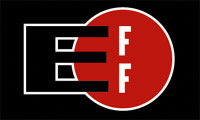 The BPI continued its policy of clamping down on illegal file sharing this week, when it contacted UK ISPs Cable and Wireless and Tiscali with requests to suspend 59 accounts.
The BPI continued its policy of clamping down on illegal file sharing this week, when it contacted UK ISPs Cable and Wireless and Tiscali with requests to suspend 59 accounts.  In a statement on 12th July, the BPI stated “Early responses from both companies suggest that they will suspend accounts which have clearly been used for illegal filesharing” and indicated that it could supply detailed evidence on the other 16 Tiscali addresses. In an interview on More Four News Tiscali spokesman Richard Ayres said Tiscali’s message to the record industry is “Come to us, give us the details and we’ll absolutely work with you.” Which would seem to be in contradiction of Tiscali’s own letter, which also stated that “Tiscali does not intend to require its customers to enter into the undertakings proposed by you and, in any event, our initial view is that they are more restrictive than is reasonable or necessary.”
In a statement on 12th July, the BPI stated “Early responses from both companies suggest that they will suspend accounts which have clearly been used for illegal filesharing” and indicated that it could supply detailed evidence on the other 16 Tiscali addresses. In an interview on More Four News Tiscali spokesman Richard Ayres said Tiscali’s message to the record industry is “Come to us, give us the details and we’ll absolutely work with you.” Which would seem to be in contradiction of Tiscali’s own letter, which also stated that “Tiscali does not intend to require its customers to enter into the undertakings proposed by you and, in any event, our initial view is that they are more restrictive than is reasonable or necessary.”  Coincidentally, the BPI action comes at the same time that the (US based)
Coincidentally, the BPI action comes at the same time that the (US based)  Last week the French legislature approved a new law which could radically change the landscape of digital audio. The so-called ‘iTunes Law’ is designed to break the control hardware manufacturers exert over the type of content that can be played by their digital music players and software. The result would be that companies such as Apple, Microsoft and Napster would have to make their data formats interoperable, thereby opening their systems to music from rivals. A regulatory body could be set up to police the sector.
Last week the French legislature approved a new law which could radically change the landscape of digital audio. The so-called ‘iTunes Law’ is designed to break the control hardware manufacturers exert over the type of content that can be played by their digital music players and software. The result would be that companies such as Apple, Microsoft and Napster would have to make their data formats interoperable, thereby opening their systems to music from rivals. A regulatory body could be set up to police the sector. 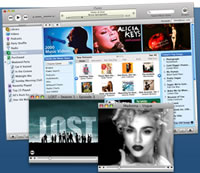 The iTunes Law does, however, leave a get-out for the tech companies. A newly-added clause permits artists to exercise control over additional DRM. In short, artists could object to their music being transferred into other formats, thereby ensuring that current practices could continue unaffected. This loophole would require renegotiation of existing contracts, something Apple et al may wish to avoid given record companies’ desire to recoup perceived losses due to piracy. Lawyers observed that the new law is complex and its impact will be difficult to judge until it is tested in court.
The iTunes Law does, however, leave a get-out for the tech companies. A newly-added clause permits artists to exercise control over additional DRM. In short, artists could object to their music being transferred into other formats, thereby ensuring that current practices could continue unaffected. This loophole would require renegotiation of existing contracts, something Apple et al may wish to avoid given record companies’ desire to recoup perceived losses due to piracy. Lawyers observed that the new law is complex and its impact will be difficult to judge until it is tested in court.  UK British music recording industry trade association, the BPi, has today issued a statement that they have “successfully jumped the first hurdle in its battle to have unauthorised Russian download site AllofMP3.com declared illegal.”
UK British music recording industry trade association, the BPi, has today issued a statement that they have “successfully jumped the first hurdle in its battle to have unauthorised Russian download site AllofMP3.com declared illegal.”  The argument of the BPI is that AllofMP3 has no right to be selling the music, as they aren’t licensed to do so. AllofMP3 counter that they are “authorized by the license # LS-3М-05-03 of the Russian Multimedia and Internet Society (ROMS) and license # 006/3M-05 of the Rightholders Federation for Collective Copyright Management of Works Used Interactively (FAIR).”
The argument of the BPI is that AllofMP3 has no right to be selling the music, as they aren’t licensed to do so. AllofMP3 counter that they are “authorized by the license # LS-3М-05-03 of the Russian Multimedia and Internet Society (ROMS) and license # 006/3M-05 of the Rightholders Federation for Collective Copyright Management of Works Used Interactively (FAIR).” 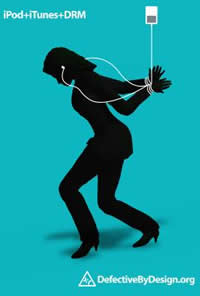 Saturday saw anti-DRM protests at eight Apple stores across the USA organised by DefectiveByDesign, who are running an on-going ‘Campaign to Eliminate DRM.’
Saturday saw anti-DRM protests at eight Apple stores across the USA organised by DefectiveByDesign, who are running an on-going ‘Campaign to Eliminate DRM.’  List of Apple stores affected
List of Apple stores affected Apple’s hugely popular iTunes music download service looks set to face some mighty competition in the coming months.
Apple’s hugely popular iTunes music download service looks set to face some mighty competition in the coming months. 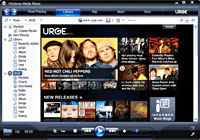 Users wanting to transfer songs onto portable music players can subscribe to the $14.95 service, with tunes protected by anticopying software from Microsoft.
Users wanting to transfer songs onto portable music players can subscribe to the $14.95 service, with tunes protected by anticopying software from Microsoft.  Noting that consumers have embraced satellite radio because it features dozens of channels with music chosen by experts, Harris reckoned that this could prove a real advantage to the Urge service.”You’ve got the experts in music here from MTV doing programming across a whole bunch of genres,” he commented.
Noting that consumers have embraced satellite radio because it features dozens of channels with music chosen by experts, Harris reckoned that this could prove a real advantage to the Urge service.”You’ve got the experts in music here from MTV doing programming across a whole bunch of genres,” he commented. 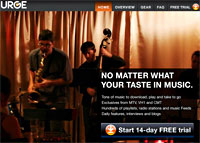 Although Harris admitted that the iPod incompatibility issue was “a hurdle that we have to get over” (an understatement, we reckon!), he added that, “there’s a long way to go in this market,” pointing out that the zillions of iPods sold still represent a fraction of the potential audience for music downloads.
Although Harris admitted that the iPod incompatibility issue was “a hurdle that we have to get over” (an understatement, we reckon!), he added that, “there’s a long way to go in this market,” pointing out that the zillions of iPods sold still represent a fraction of the potential audience for music downloads.  Major UK consumer broadband providers NTL are teaming up with BitTorrent, the developers of the world’s most popular peer-to-peer (P2P) application.
Major UK consumer broadband providers NTL are teaming up with BitTorrent, the developers of the world’s most popular peer-to-peer (P2P) application.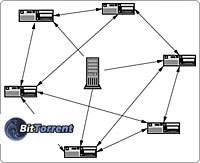 Naturally, rights holders and movie heavyweights weren’t too chuffed to see their content whizzing around the Internet for gratis, and quickly hired in squadrons of lawyers to apply pressure on BitTorrent.
Naturally, rights holders and movie heavyweights weren’t too chuffed to see their content whizzing around the Internet for gratis, and quickly hired in squadrons of lawyers to apply pressure on BitTorrent. Inga Chernyak, until recently, had a legal clerk job at an IP law firm in New York City. On the 26 January she was called in to the firms HR department and fired.
Inga Chernyak, until recently, had a legal clerk job at an IP law firm in New York City. On the 26 January she was called in to the firms HR department and fired.  There may be those who think that it’s pretty obvious that is you work in an IP firm; wanting to train as an IP lawyer; you hold views that IP law is over restrictive; then have your name and photo featured in an article that starts by describing how to circumvent CD DRM protection and are a founder of NYU chapter of the Free Culture movement – you’re going to end up in trouble said IP law firm.
There may be those who think that it’s pretty obvious that is you work in an IP firm; wanting to train as an IP lawyer; you hold views that IP law is over restrictive; then have your name and photo featured in an article that starts by describing how to circumvent CD DRM protection and are a founder of NYU chapter of the Free Culture movement – you’re going to end up in trouble said IP law firm.  In its submission this week to an MPs’ inquiry into Digital Rights Management (DRM), the influential National Consumer Council (NCC) spelt out its concern at current self-regulation, and called for new laws to ensure consumers’ rights to use digital content are protected.
In its submission this week to an MPs’ inquiry into Digital Rights Management (DRM), the influential National Consumer Council (NCC) spelt out its concern at current self-regulation, and called for new laws to ensure consumers’ rights to use digital content are protected. People are finding they can’t play the DVDs they’ve bought abroad or make compilations of material that they have purchased for their own use. The NCC believes that the use of DRM can and is already constraining the legitimate consumer use of digital content. It is also undermining consumers existing rights under consumer protection and data protection laws.
People are finding they can’t play the DVDs they’ve bought abroad or make compilations of material that they have purchased for their own use. The NCC believes that the use of DRM can and is already constraining the legitimate consumer use of digital content. It is also undermining consumers existing rights under consumer protection and data protection laws. Jill Johnstone, Director of Policy at NCC said; “Because of the current situation, consumers face security risks to their equipment, limitations on their use of products, poor information when purchasing products and unfair contract terms.
Jill Johnstone, Director of Policy at NCC said; “Because of the current situation, consumers face security risks to their equipment, limitations on their use of products, poor information when purchasing products and unfair contract terms.